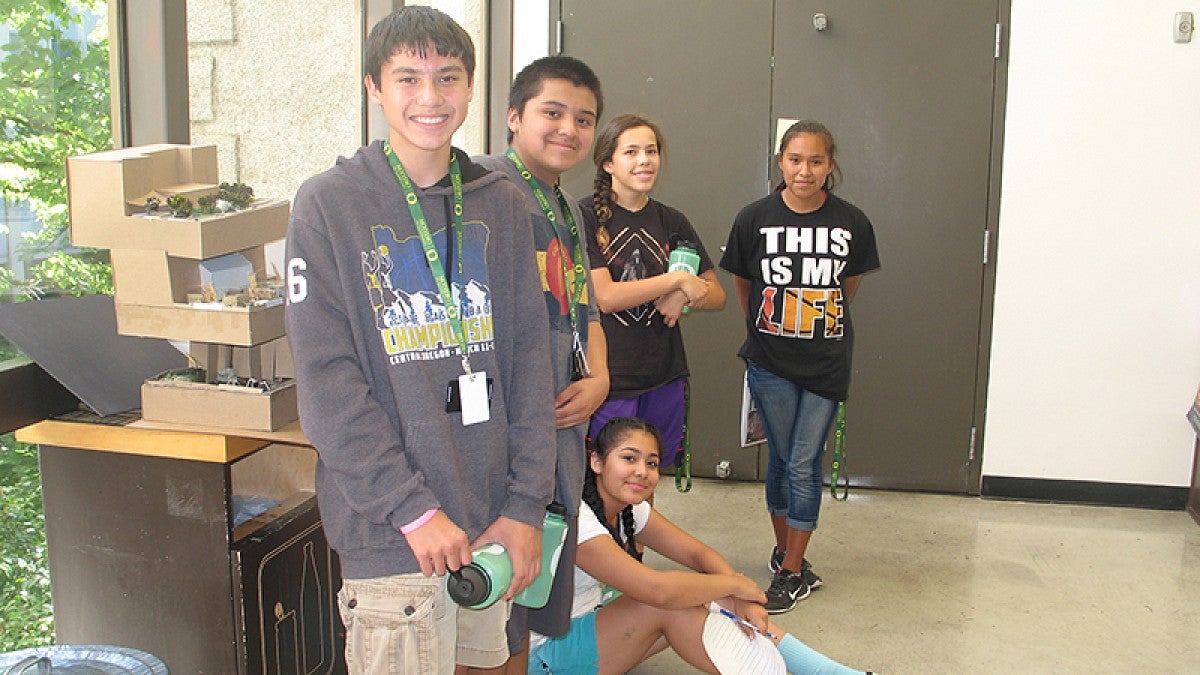When most eighth-graders go home at the end of the day, one of the first questions they might ask is: “What’s for dinner?”
But, thanks to a folklife field school through the UO’s Oregon Folklife Network, a group of rising eighth-graders from the Confederated Tribes of Warm Springs spent a week asking much deeper questions of their families, to get answers that would help their tribe and their own educations.
During an intensive weeklong lesson in cultural documentation, the group of 11 students went home and conducted professional-level folklore interviews to learn more about their cultural heritage. They sat down with grandparents and siblings and aunts and parents, asking them a series of questions about native people and traditions, like fishing, hunting, food-gathering and beading.
They used that college-level education in folklore concepts and skills to document and present their findings, to both their tribal community in Warm Springs and to an audience at the UO. Their presentations will also be archived in their tribe’s historical collections to help maintain a record of tribal traditions.
“The Confederated Tribes of Warm Springs want tribal members who understand the value of cultural heritage,” said Riki Saltzman, executive director of the Oregon Folklife Network. “The tribe does not want to lose any more knowledge.”
UO’s Oregon Folklife Network collaborated with the Confederated Tribes of Warm Springs K-8 Academy and its Culture and Heritage Department to conceptualize the inaugural field school, which strategically targeted students at an age when they face a higher risk of dropping out of school. They recruited the help of Anne Pryor, an accomplished folklorist and educator, to design and teach the curriculum for this pipeline program. The project was funded by the Oregon Cultural Trust and UO’s Division of Equity and Inclusion
Each student received a college credit in folklore through the UO to acknowledge their scholastic accomplishment. The group also spent two days on campus, where they met with members of UO’s native community and got a taste of college life.
“This program is about helping students achieve their potential,” Saltzman said. “The college-level coursework and visit to UO’s campus enabled them to realize that they can and might want to go to college.”
Following their presentations, many of the students said they are interested in pursuing a college degree. While they said they’re still not sure whether they want to be veterinarians or chemists or folklorists, they did seem quite sure that UO is currently one of their top choices.
“This truly is a pipeline program,” Pryor said. “We are planting the seed for them to think ‘Yes, I can go to college.’”
“Our vision is to mentor native students every year and teach them these amazing skills and valuable processes, with the hope that they’ll want to join and enhance the University of Oregon community,” Saltzman said.
And as an added bonus, students also came away with a newfound enthusiasm for folklore work.
“What I’ve enjoyed about the fieldwork I’ve done is everything,” said Jason, one of the program’s students, during his presentation on campus.
Despite being the beneficiaries of traditions passed down for generations, it was clear most of the students had not previously asked their families much about their cultural heritage. Student after student expressed surprise at the knowledge gained through their family history lessons, while at the same time recognizing that the traditions have been an integral part of their lives.
“This work is so important to me because my aunt said that someday I would take her place as food gatherer,” said Kathryce, another of the students.
In addition to learning a great deal about their families and tribal traditions, they also learned a valuable lesson about college: It might not always be easy, but it’s worth it.
“I wouldn’t change anything because the things we did in class were really helpful,” said one student as he closed his presentation. “I didn’t want to do them, but they were helpful.”
—By Emily Halnon, University Communications


